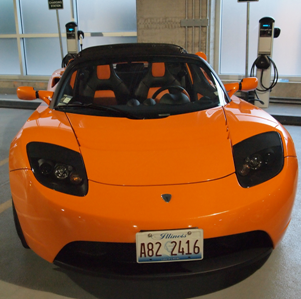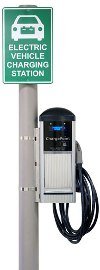A Tesla recharging at one of the Carbon Day stations inside the Parc Huron garage
Carbon Day Automotive LLC is betting its business on the expectation that electric vehicles will soon share the Midwest’s roads in significant numbers with their gas-guzzling and hybrid counterparts.
The Chicago-based startup is selling charging stations for electric vehicles to parking garages, apartment building owners, municipalities and others throughout the Midwest in anticipation that many of today’s drivers will opt for plug-in cars when dealerships begin selling them locally, says Brian Levin, one of Carbon Day’s four private owners. The two-year-old company is the sole Midwest distributor for Coulomb Technologies, a California-based electric battery charging station manufacturer considered a leader in its sector.
You can find Carbon Day’s charging stations scattered throughout Chicago, including: the garage at Millennium Park, many of InterPark’s public parking garages and the dazzling new Aqua apartment building near the lakefront. The city of Chicago has one solar-powered station as a demonstration project at Northerly Island. And Exelon just inked a deal to purchase 36 of them for its Commonwealth Edison electric car fleet.
There currently are about 200 zero-emission vehicles already on Chicago’s roads that need charging stations to plug in and juice up, Mr. Levin estimates. Depending on the car you own, EV batteries need to be recharged every 40 to 100 miles of use.
The highly anticipated Nissan Leaf and Chevrolet Volt electric vehicles are rolling off the assembly lines and will be available soon in the U.S. However, neither automaker has included Illinois or most other Midwest states as part of their initial launch. Tesla Motors, a high-end electric car manufacturer, opened a dealership last year in Chicago. There’s about 65 of them on the road, but don’t expect to see them everywhere just yet: The Roadster model will set you back about $100,000 before you can drive one off the lot.
Despite the limited number of EV drivers cruising around locally today, Carbon Day’s owners are optimistic sales will take off as soon as those cars are widely available in Illinois and the surrounding states.
The early signs are promising. Carbon Day has sold and installed close to 60 charging stations in Chicago and will be up to 100 in the next few months. An additional 70 have been installed throughout its 10-state territory in the last year. Mr. Levin, an exuberant 28-year-old, expects to sign deals for about 500 installations in the Chicago area and 1,500 more scattered throughout its territory by the end of next year. They just signed a deal to sell 24 stations to Madison, Wis.-based Gas & Electric Co., and Carbon Day is the official vendor to the state of Minnesota.
Crain’s met up with Mr. Levin recently. He showed off one of the company’s charging stations at the Parc Huron LEED-certified apartment building near its River North headquarters and talked about how the product’s sophisticated network will appeal to both buyers and EV drivers.
Crain’s: How challenging is it to sell charging stations in the Midwest when there aren’t many electric cars on the roads yet?
Mr. Levin: It’s the chicken before the egg. We’re trying to build the infrastructure and wave our hands to the rest of the country to say, “Bring your electric vehicles here and put them in our dealerships.” The cars will never come if there aren’t public places to plug them in. But I’m optimistic because we’re an energetic company and we’re finding progressive companies and municipalities to work with.
Brian Levin
The more the public sees these charging stations, the more it will become ingrained that this is something to consider. Right now, our efforts are about demonstration as much as they are about an amenity for EV owners.
Many companies are buying them now for marketing purposes. The charging stations get prime parking spots in most garages where they’re being installed. If they do an $800,000 retrofit of their lighting or install solar panels on the roof — no one sees that. This is something that slaps everyone right in the face when they walk onto a lot. It tells everyone, “We’re green,” and it’s a much cheaper way of demonstrating that to the public.
Crain’s: What are some of the benefits that inspire corporations and municipalities to invest in charging stations?
Mr. Levin: A building owner or retailer can log in and see which charging stations are in use, how much revenue they’re generating and how much energy they’re using. The owner of the lot collects money from people parked there recharging their batteries, and they pay the utility company for the energy supplied to their customer. Some owners of the stations are giving away the energy for free as an amenity, some might charge per hour, or per session fee. The amount of money they make is automatically deposited into their account at the end of the month.
For municipalities and EV fleets owned by corporations, they can track how much greenhouse-gas emissions they’re saving by using these cars. Many of them have to report this data, so they can look at how much gas they’re saving by using electric cars instead. They might also want to share this information with their customers.
Crain’s: You have some cool applications that link EV owners to a sophisticated network. Can you explain how it works?
Mr. Levin: Every driver can go on their BlackBerry, iPhone or Android and hit an app that locates the nearest charging station to wherever they are that isn’t currently in use. If you hit the next button, it will give you the quickest route to get there, using navigational technology. The app will also tell you the price differences of the charging stations that are near you. It’s a very cool real-time application that Coulomb designed.
When you get to the charging station, you can use your ChargePass account, like an I-Pass account, that will debit your account and automatically replenish it when it gets low. You can also use your credit card, and you can start charging your battery from your phone, or stop charging it from any place you might be. The minute the charging station detects that the car is fully charged, it shuts off, sends an e-mail or text to the vehicle owner telling them their charging session is complete.
Crain’s: What kind of competition are you finding in the local market?
Mr. Levin: As of right now, we know of no other products being installed in Chicago. We have a two-year head start on other companies, but we expect some competition down the road. There’s about seven or eight other companies nationally coming out with charging stations, but we’ve got a proven track record and some of these companies are still in prototype stages. Coulomb has thousands of them installed throughout the world.
Crain’s: What kind of car do you drive?
Mr. Levin: I don’t own a car right now, but our company has two electric vehicles that I can use. We have a ZAP electric car and a converted Prius. It used to get 40 miles to the gallon and we added some features so now it gets 100 miles to the gallon when it’s in the blended mode. I also use I-GO Car Sharing, which has lots of hybrids and will soon have electric cars too.




